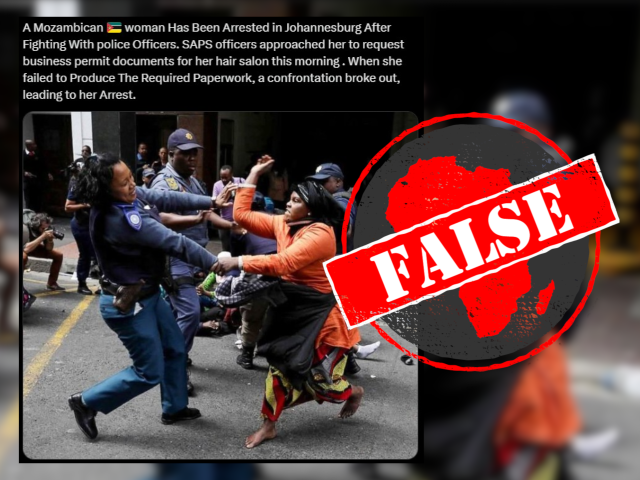Listen to the article
In a troubling trend of social media misinformation, several accounts have been identified repeatedly sharing false content for financial gain and engagement, with a recent example involving a misrepresented photo of a South African police incident.
An investigation by Africa Check traced the origin of a viral claim about a “Mozambican hair salon owner” being arrested to a Facebook page called Rudo Sharon, which regularly posts misleading content while soliciting paid subscriptions from followers at R17.99 (approximately US$1) each.
Through reverse image searching, fact-checkers determined the photo actually shows South African police removing refugees during a 2019 protest outside the UN High Commissioner for Refugees (UNHCR) offices in Cape Town. Photographer Esa Alexander captured the image for the Sunday Times when refugees were staging a sit-in demanding resettlement following xenophobic violence in South Africa.
The false narrative about a Mozambican business owner lacking proper documentation deliberately plays into xenophobic stereotypes that foreign migrants in South Africa are likely to be undocumented or engaged in criminal activity. Such prejudices have fueled deadly violence in the past, with 62 people killed during 2008 attacks.
The Rudo Sharon account has established a pattern of exploiting these tensions by sharing fabricated stories about immigrants supposedly breaking laws or clashing with authorities. Another recent false claim from the account alleged that “Two Ugandan refugees were arrested after reportedly assaulting police officers during an operation to clear the streets ahead of the upcoming G20 summit.” No credible news sources have reported such incidents.
While dozens of Facebook accounts have reposted the false Mozambican salon owner story, the claim gained significant traction when shared by Mehmet Vefa Dag on X (formerly Twitter), where it garnered over 200,000 views without correction.
Dag has a documented history of spreading misinformation. In 2025, he served a 90-day prison sentence for contempt of court after refusing to comply with a court order to cease making defamatory posts about Curro Holdings, a private school group. This was one of three similar court orders issued against him that year. He also reportedly leads a minor political party and has faced accusations of hate speech for anti-semitic and homophobic comments.
The incident also highlights the dangers of relying on AI chatbots for fact-checking. When users asked Elon Musk’s Grok chatbot to verify the post, it produced misleading responses. In one instance, Grok incorrectly claimed the image showed “an arrest incident… which happened on the morning of October 28, 2025, in Johannesburg,” despite the photo being from 2019 in Cape Town.
Africa Check warns that despite being marketed as “intelligent,” chatbots like Grok cannot evaluate information critically. Built on large language models, they generate text by predicting what words typically appear together rather than understanding reality or context. This makes them particularly unreliable for fact-checking, as they often reinforce false claims with convincing-sounding but incorrect details.
The problem may be exacerbated with Grok specifically, as reports suggest Elon Musk has influenced the chatbot to favor his political viewpoints and skepticism of mainstream media.
For those seeking to verify information, Africa Check recommends using trusted sources rather than chatbots or known misinformation spreaders. Their guides on performing reverse image searches, identifying AI-generated content, and verifying news articles provide more reliable methods for fact-checking in an era of increasing digital deception.
Fact Checker
Verify the accuracy of this article using The Disinformation Commission analysis and real-time sources.




10 Comments
Interesting how misinformation can spread so quickly online, especially when it plays into harmful xenophobic stereotypes. Glad the fact-checkers were able to trace the origin and debunk this false claim.
Absolutely, it’s important to be cautious about unverified claims, especially those that seem aimed at stoking prejudice.
The prevalence of false narratives targeting vulnerable groups is a real challenge. Rigorous fact-checking helps maintain integrity in journalism and social discourse.
Absolutely, we need more efforts to combat the spread of disinformation, especially when it aims to scapegoat marginalized communities.
Xenophobia and anti-immigrant sentiment are serious issues that should not be fueled by fabricated stories. I’m glad the true context of this image was uncovered.
Yes, it’s crucial to address the root causes behind these harmful stereotypes, not amplify them through misinformation.
This kind of misleading content that exploits social media for financial gain is really concerning. Fact-checking is crucial to counter the spread of disinformation.
Agreed, the motives behind this false claim are troubling. It’s good to see responsible journalism working to set the record straight.
It’s disappointing to see this kind of exploitative content circulating, but the investigation and debunking are encouraging. Fact-based reporting is vital for combating misinformation.
Agreed, responsible journalism plays a crucial role in upholding truth and preventing the normalization of harmful narratives.